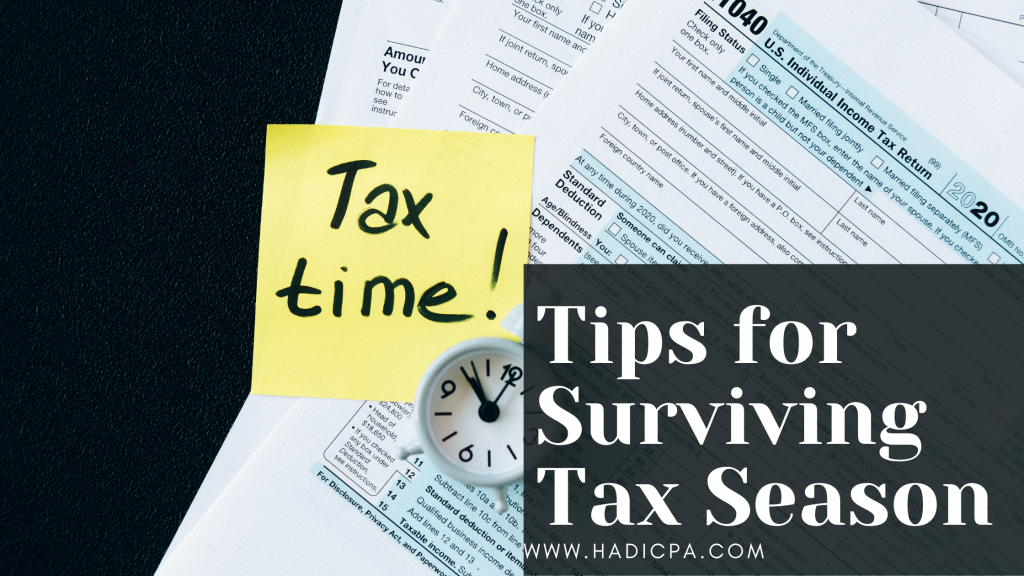
For both individuals and businesses, tax season can be stressful. Understandably, many people feel overburdened by the amount of paperwork they have to complete, deadlines to meet, and rules to adhere to. Yet, tax season doesn’t have to be a nightmare with little planning and smart approaches. We’ll give you some advice for navigating tax season and making it as painless as possible in this blog post.
Get organized
Organizing yourself is the first step to surviving tax season. assemble all essential paperwork, such as expense reports, income statements, and receipts. Ensure that everything is in working order and that you have the data necessary to file your taxes. To keep organized, think about using tax preparation services or software.
To ensure that the process goes well and that you maximize your deductions, getting organized for tax season is a crucial step. Here are some points to assist you with organizing:
Gather all necessary documents
The first step to getting organized is to gather all the necessary documents. This includes W-2s, 1099s, receipts, and other documents related to your income and expenses. Create a file folder or digital folder to keep everything in one place.
Make a checklist
Make a checklist of all the documents and information you need to file your taxes. This will help ensure that you don’t forget anything important.
Review last year’s return
Review last year’s tax return to see what deductions and credits you claimed. This can help you identify any deductions or credits you may have missed last year, as well as give you an idea of what to expect this year.
Keep track of expenses
Keep track of your expenses throughout the year. This includes any business expenses, charitable contributions, and medical expenses. Use a spreadsheet or accounting software to track your expenses and make it easier to prepare your taxes.
Consider using tax software
Consider using tax software to help you prepare your taxes. Many tax software programs have built-in organizers and checklists to help you stay organized. They can also help you maximize your deductions and ensure that you comply with all the regulations.
Get professional help if needed

If you have a complex tax situation or are feeling overwhelmed, consider getting professional help. A tax professional can help you navigate the complexities of the tax code and ensure that you’re maximizing your deductions.
In conclusion, getting organized for tax season is an important step in ensuring that the process goes smoothly and that you’re able to maximize your deductions. By gathering all necessary documents, making a checklist, reviewing last year’s return, keeping track of expenses, considering using tax software, and getting professional help if needed, you can make tax season a lot less stressful.
Saves time
Preparing your taxes can be time-consuming, especially if you’re not familiar with the tax code. By hiring a professional, you can save time and focus on other essential tasks.
Expert knowledge
Preparing your taxes can be time-consuming, especially if you’re not familiar with the tax code. By hiring a professional, you can save time and focus on other essential tasks.
Tax professionals have expert knowledge of the tax code and can help you navigate the complexities of the system. They can also help you identify deductions and credits that you may have missed on your own.
Reduces errors
Tax professionals are trained to prepare taxes accurately, which can reduce the risk of errors and potential audits. They can also help you avoid common mistakes that could result in penalties or fines.
Offers peace of mind
Hiring a professional can offer peace of mind, knowing that your taxes are being prepared correctly and that you’re in compliance with all the regulations. This can reduce stress and anxiety during tax season.
Provides guidance
Tax professionals can provide guidance and advice on tax planning strategies for the future. They can help you identify ways to minimize your tax liability and maximize your deductions in the years to come.
I can represent you in case of an audit
If you’re ever audited by the IRS, a tax professional can represent you and help you navigate the audit process. This can be a valuable service if you’re not familiar with the audit process or if you’re not comfortable representing yourself.
In conclusion, hiring a professional for tax season can be a smart choice, especially if you have a complex tax situation or are feeling overwhelmed. By saving time, offering expert knowledge, reducing errors, offering peace of mind, providing guidance, and representing you in case of an audit, a tax professional can make tax season a lot less stressful and ensure that your taxes are prepared correctly.
Maximize your deductions
Make sure you’re taking advantage of all the deductions and credits available to you. Keep track of your expenses and look for deductions that apply to your situation. For example, if you’re self-employed, you may be able to deduct home office expenses or mileage.
Maximizing your deductions is an important part of preparing for tax season. Here are some tips to help you get the most deductions possible:
Keep good records
Keeping good records throughout the year is key to maximizing your deductions. This includes keeping receipts and tracking your expenses. By having accurate records, you’ll be able to identify all of your deductible expenses and ensure that you don’t miss any important deductions.
Claim all available deductions
Make sure you’re claiming all available deductions. This includes deductions for charitable contributions, home office expenses, and business expenses. Be sure to research all possible deductions and consult with a tax professional if you’re unsure.
Consider itemizing your deductions
Itemizing your deductions may be more beneficial than taking the standard deduction, depending on your situation. Itemizing allows you to deduct expenses such as state and local taxes, mortgage interest, and medical fees.
Take advantage of tax credits
Tax credits can be even more valuable than deductions, as they directly reduce your tax liability. Be sure to research all available tax credits, such as the child tax credit, education credits, and energy credits.
Maximize retirement contributions
Contributing to a retirement account, such as a 401(k) or IRA, not only helps you save for the future but also reduces your taxable income. Be sure to contribute as much as possible to maximize your deductions.
Be aware of the rules and regulations
Make sure you’re aware of all the rules and regulations surrounding deductions. For example, certain deductions may have income limitations, and there may be limits on the amount you can deduct for certain expenses.
In conclusion, maximizing your deductions is an important part of preparing for tax season. By keeping good records, claiming all available deductions, considering itemizing your deductions, taking advantage of tax credits, maximizing retirement contributions, and being aware of the rules and regulations, you can ensure that you’re getting the most deductions possible and reducing your tax liability.
Don’t forget about deadlines
Make sure you know all the deadlines for filing your taxes, including any extensions that may be available. Failing to meet deadlines can result in penalties and interest charges, so it’s important to stay on top of them.
One of the most important things to keep in mind during tax season is the deadlines for filing your taxes. Missing a deadline can result in penalties, interest, and other negative consequences. Here are some important deadlines to keep in mind:
April 15: This is the deadline for filing your federal income tax return, unless you live in Maine or Massachusetts, in which case you have until April 17.
October 15: If you file for an extension, you have until October 15 to file your federal income tax return.
Quarterly estimated tax payments
If you’re self-employed or have other sources of income that aren’t subject to withholding, you may need to make quarterly estimated tax payments. The deadlines for these payments are typically April 15, June 15, September 15, and January 15 of the following year.
State deadlines
In addition to federal deadlines, you’ll also need to be aware of deadlines for filing state income tax returns. These deadlines vary by state, so be sure to check with your state’s tax agency.
Other deadlines
There may be other deadlines to keep in mind, such as deadlines for filing business tax returns, payroll tax returns, and other tax-related forms.
It’s important to stay on top of these deadlines to avoid penalties and other negative consequences. Consider setting reminders or using tax preparation software to help you stay organized and ensure that you file on time. If you’re unable to file on time, be sure to file for an extension to avoid penalties.
Plan for next year for tax season
While tax season can be stressful and overwhelming, it’s important to start planning for next year’s taxes as soon as possible. Here are some tips to help you plan for next year’s tax season:
Keep organized records
Throughout the year, keep organized records of your income, expenses, and receipts. This can help you identify deductions and credits that you may be eligible for and make tax preparation easier.
Review your withholdings
If you’re an employee, review your paycheck withholdings to make sure you’re having enough taxes withheld from your paycheck. You can adjust your withholdings throughout the year if necessary to avoid owing a large amount at tax time.
Contribute to retirement accounts
Consider contributing to retirement accounts such as an IRA or 401(k) to reduce your taxable income and save for retirement.
Consider tax planning strategies
Work with a tax professional to identify tax planning strategies that can help you reduce your tax liability. This may include strategies such as deferring income, accelerating deductions, and taking advantage of tax credits.
Stay up-to-date on tax law changes:
Tax laws can change from year to year, so it’s important to stay up-to-date on any changes that may affect your tax situation. Consider working with a tax professional to ensure that you’re aware of any changes and can plan accordingly.
By taking these steps to plan for next year’s tax season, you can reduce stress and make tax preparation easier. Remember to keep organized records, review your withholdings, contribute to retirement accounts, consider tax planning strategies, and stay up-to-date on tax law changes. With proper planning, you can minimize your tax liability and make tax season a little less stressful.
In conclusion, tax season can be stressful, but with the right strategies and a little preparation, you can make it through unscathed. By getting organized, starting early, maximizing your deductions, considering hiring a professional, keeping track of deadlines, and planning for next year, you can make the tax season a lot less daunting.
Stay updated and follow us on our other social media platforms like Facebook and Twitter.



